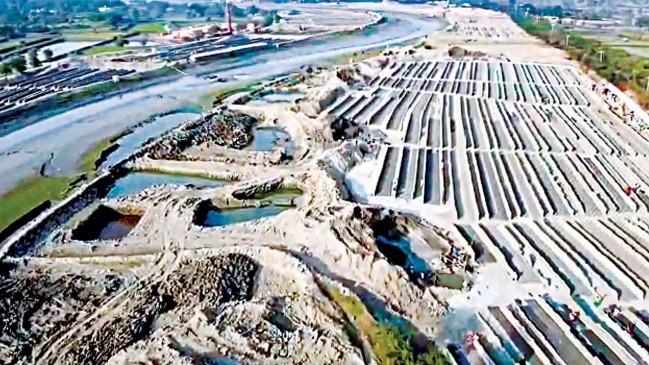Bhadra and Hori rivers are on their deathbeds

Dhaka, 3 March, 2021: The picture on The Daily Star's front page yesterday said it all. The Bhadra, a once, free-flowing river, mercilessly cut up and occupied to make way for brick kilns turning it into a narrow canal that may also be gobbled up by greed. This systematic murder—the High Court has declared rivers as legal entities—has been possible as the report found out, due to a nexus of local influential people that include elected representatives with the local administration allowing this crime to go on for years on end.
According to a report prepared by Bangladesh Water Development Board (BWDB) Khulna, nine brick kilns on one bank of the Bhadra were listed last December. They included those operated by a lawmaker and chairman of a upazila and a union parishad. So far a total of 18 brick kilns along the Bhadra and Hori rivers have been named in the list with more to be added. Unsurprisingly, such indiscriminate encroachment has completely stopped at least three connecting canals of one of the branches of the Bhadra river whose width has narrowed from 500 m to 16-30 m.
What is surprising is that although grabbing land is a criminal offence, these brick kilns have been running for the last 12 years with impunity. Apart from sending notices to the brick kiln owners from time to time no attempts have been made to shut down the kilns or hold the owners accountable. The Brick Making and Establishment of Bricks (control) Act 2013 states that setting brick kilns on government or privately owned forests, sanctuaries, agricultural land, gardens and wetland areas is a punishable offence. How ironic then is that a member of parliament and an upazila chairman, both of whom are government representatives, would be setting up brick kilns on river land?
The UP chairman who owns brick kilns that occupies huge areas of the Hori and Bhadra riverbanks claims that they were set up with official approval when asked by this paper's correspondent whether this had been done with the Department of Environment's go ahead.
As usual everyone concerned is shifting blame on someone else. While the brick kiln owners claim that these are not part of the rivers, the director of Department of Environment in Khulna evaded the question by saying it was not possible to say which brickfields have been built occupying the two rivers or whether they are destroying the environment. So the conundrum of why a river can be killed so easily is not so difficult to solve. It is because the law is merrily flouted by everyone concerned including elected officials. It is because the local administration gives mere lip-service to accountability, sending notices that continuously remain unheeded and for no further action to be taken beyond that. It is because of the apparent lack of information or interest plaguing the DoE in the area. Finally, it is the total lack of accountability of individuals who are either public officials or connected to influential people or whose job it is to monitor activities that pose threats to the environment and that constitute a crime such as killing a river. Unless the chain of accountability and enforcement of the law is ensured by the government, we will continue to see such blatant grabbing of river banks, destroying agricultural land and the ruthless butchering of rivers.
Read More
.

